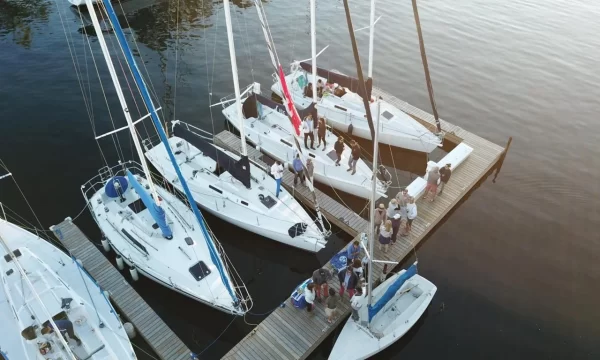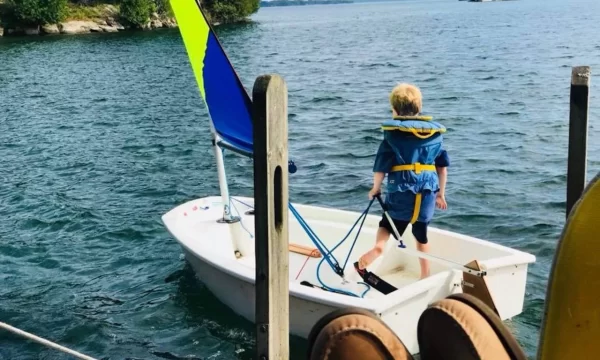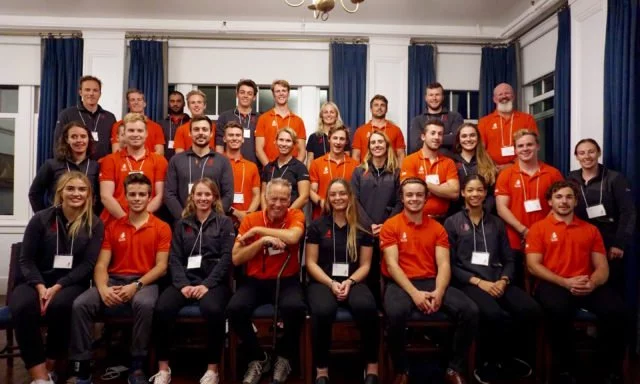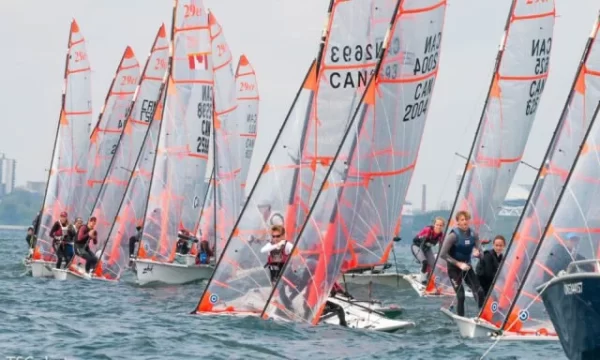Photos: Jean-Louis Carli/Jean-Marie Liot / Alea
Melodie Schaffer and Ryan Barkey finished 41st at the Transat Jacques Vabre event after 26 days and 8,500 km of racing between Le Havre, FRA, and the Martinique.
“On Deck” conversation with the sailors from Toronto.
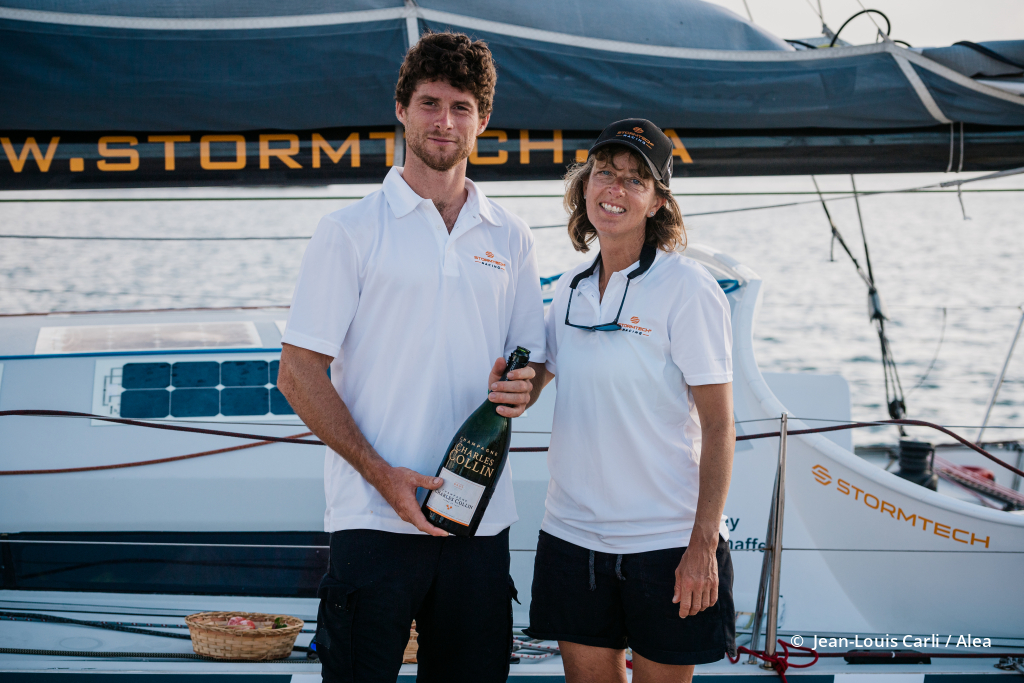 After 26 days of competition, how do you feel?
After 26 days of competition, how do you feel?
Melodie: I am so pleased we raced in the Transat Jacques Vabre. I believe we are the first Canadian team to finish the race. We knew the racing was going to be tough because we were up against many of the best sailors in the world in CLASS40Ûªs. Most, if not all, the other boats and teams had more experience than us. We chose to compete in the event to push ourselves to be at our very best.
Are you satisfied with your 41st position?
Ryan: As a team we were really working hard to place as high up in the rankings as possible. Even though this was a new boat and a new partnership, we had worked hard to prep the boat and ourselves prior to the race in our compressed time frame. And against the best in the world, we canÛªt really be too upset with our placing. Although we both hate to lose, we learned a lot about the boat, what work needs to be done and what we need to work on as a team to perform better for our upcoming race, the Globe 40 in 2022. So, in these regards, this was a very successful and productive race. We would have liked to have finished mid-fleet of course, but a few mistakes early on, coupled with what seemed like endless wind holes and a few issues with the boat… Try as we might, we could not work up the ladder. And sometimes a tough loss is exactly what you need to make you even hungrier to do better in the next one.
Melodie: I do wish we had placed better, but ultimately our goal was not the overall race result. We knew what we wanted to achieve going into this event, but I am such a diehard racer it is hard to accept that we did not finish higher up. We have many future plans for CLASS40 and double-handed racing, and competing in this event accelerated our learning.
You are experienced offshore racers, you have taken part in many events of that type before. How would you compare the Transat Jacques Vabre to those previous races?
Melodie: Offshore is different from regatta racing on some level. Of course we are all competing against each other, but once offshore, for the most part you are on your own and you must handle the weather, breakdowns, medical issues, and ultimately any situation yourself. If things go truly wrong, it will be your competitors who will be there to help. So you are competing against each other, but you are there for each other as well.
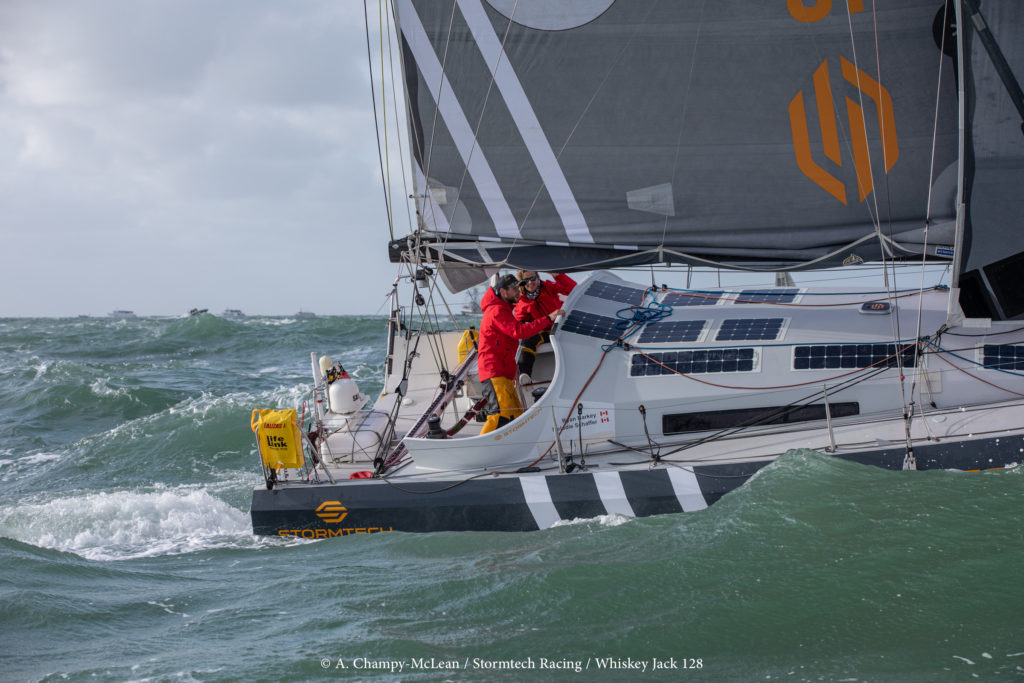 What was your biggest challenge and why?
What was your biggest challenge and why?
Ryan: Our biggest challenge during the race, I think, was managing sleep and energy consumption. We had some issues with the autopilot, struggling to keep up conditions, despite working through variations of the calibrations, which meant a lot of hand steering with the kite up. For days on end, pressing to make up the miles meant for a sleep-deprived team.
Melodie: The biggest challenge was related to power generation concerns. This began a couple of days into the race and it meant that we did a lot more helming. Ryan and I steered the boat for probably half the race. Ten to 12 hours a day of helming is tiring and especially with the spinnaker up, it is intense. It will make us better sailors for this boat, but it made for a much tougher race.
We also had small things go wrong, which is expected. We hit a pallet, but fortunately there was no damage to the hull or rudders. The tiller extension broke and our backup one was faulty, so we had to jury rig and rebuild the one we had. We blew the spinnaker, which was truly unfortunate and a horrible moment, but we had been pushing the boat hard because it was the only way we were going to make up ground, so it was not unexpected to lose a spin. As well, both Ryan and I had a cold early on in the race and with so little sleep, it is harder to shake an illness. Plus, the alternator wasn’t charging the batteries right so we had to repair that. And we hit a shark.
The longer race time also was tough. Mentally and emotionally, you gear up for a length of time. Having it be so much longer meant we had to pay attention to food consumption and adjust our race mindset for the longer time.
Problems with the generator and power, the biggest spinnaker blew, the boat pinned down on its side, you hit an unidentified floating object… When were you the most afraid during the race?
Ryan: I wouldnÛªt say we were ever afraid during the race, not to sound like we are pumping our own tires by any means butÛ_ When you spend your life on the water, these, believe it or not, become pretty common occurrences and what separates good sailors from great sailors is dealing with issues in a calm, steady and domineering way.
Melodie: There was never a time when I was worried about safety. With the help of some problem solving, these were all manageable issues. With offshore races, sometimes you are one thousand miles from help, so you learn to be resourceful.
Regarding the generator and power, what was the problem and how did you fix it?
Ryan: The problem with the generator was an issue with the 3-phase cabling. Basically, we had sent the unit in for a service prior to race start to make sure the unit was running as reliably as possible. The issue was that the cable that connects to the converter (on the boat) and the generator itself (hydro unit) had shorted. So, despite it working great for the first three days, the unit started making troubling noises to say the least, combined with a severe drop in input to the batteries. Knowing that the unit had just been serviced and knowing the cable hadnÛªt been replaced in this process, this was deemed the best place to begin the troubleshooting. We reached out to the company for advice on troubleshooting as well, and the process was relatively simple: it was just a matter of dismantling the unit and stripping out the old cable and replacing with new material, then resealing the unit. This seemed to do the trick.
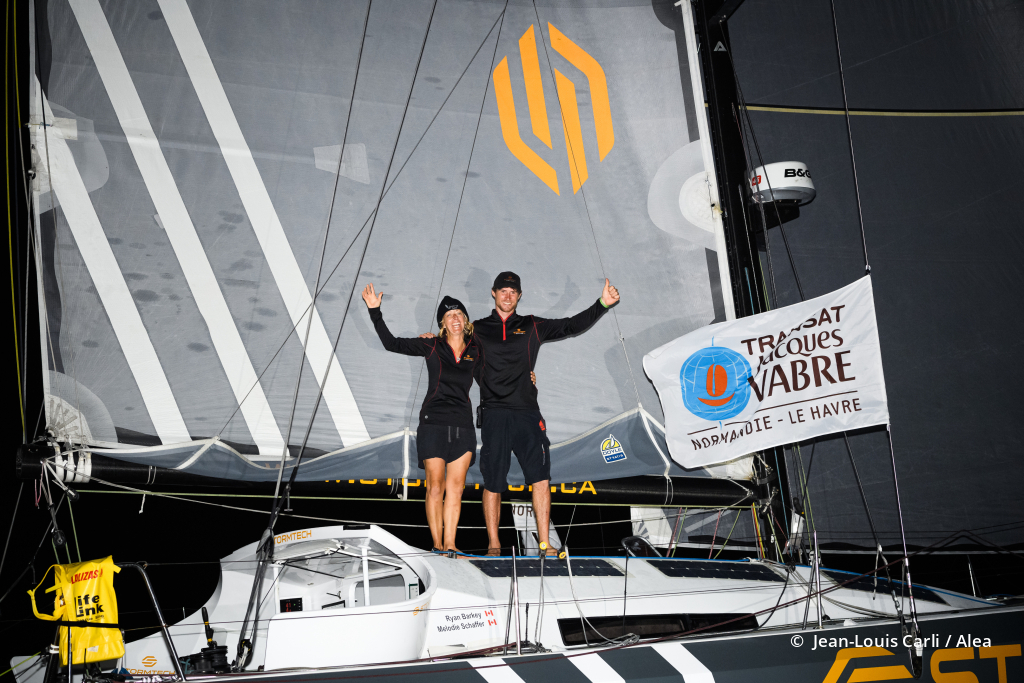 There was even a shark that got stuck on the keel. Were you afraid when you had to remove it?
There was even a shark that got stuck on the keel. Were you afraid when you had to remove it?
Ryan: when you spend enough time at sea and moving at the speeds we do, itÛªs inevitable that you will end up hitting something. But this was a first for us, for sure, and one we wonÛªt soon forget. The odds of that happening are so slim — not hitting something as such, but the fact that we hit it in a manner that it got wedged so evenly around the keel and the hull join that the 2 å_ m shark was literally wrapped around our keel. We had to drop our kite and turn to irons and attempt to sail backwards to remove it as we deemed that it was ÛÏprobably not a good idea to go try and pull the potentially very angry shark off by hand”. The surprise I had when I jumped in initially was enough.
What was your biggest physical challenge?
Ryan: The biggest physical challenge was no doubt the sail changes — many, many sail changes. Many of which were actually done single handily to give each other a chance to get some uninterrupted sleep. But even with the two of us up on the job, it is still very much an energy-intensive task and, on a couple of those days, you can just feel your energy being depleted.
The wind seemed to be up and down through the race. Did you feel helpless or dejected at some point?
Ryan: The wind was definitely up and down throughout the race, especially early on along the coast of France. The wind gods were not in our favour. In the first few days, it seemed like the only sailing we were doing was just trying to make the boat move, forget about what direction we were going. Sometimes it was just due to currents that we covered any ground. ItÛªs always discouraging when you look on the tracker and you can see the rest of the fleet sailing off in the distance and you look at your instruments and they read ÛÏwind 0.0Û and ÛÏboat speed 1.0Û or 1 kt in the wrong direction. You just have to keep being mentally strong ÛÒ remember that itÛªs a long race and there is always the potential to make it back.
Melodie: There was definitely some frustration with the wind holes. One time we were caught in one, and we had pushed ourselves and the boat so hard the prior day. We gained four spots and then sat in a wind hole for a day and half, and it seemed every other boat around us got the wind before we did. We lost all the ground that we had made up. That was disappointing.
What was your biggest mental challenge?
Ryan: The biggest mental challenge was staying positive towards the end of the race because itÛªs never over until itÛªs over and anything can happen. So you need to push hard to the very end. But you reach a point that no matter what you do, the gap just canÛªt be closed with some boats and the final positions start to settle. This, coupled with the fact that we had blown our biggest kite, ÛÏour trade windsÛ kite, it made it very frustrating to work towards the finish line knowing we were running at a rate that was 10% to 12% less than optimal. The idea of a less-than-ideal finishing position was becoming a reality.
What did you learn from this race?
Ryan: We learned a lot from this race, in regards to ourselves and ways to improve our ability to sail the boat as a double-handed team. But I think most apparent was the boat, tricks and quirks of the boat trimming wise, as well as things ÛÏJackzie” needs a bit of work on. We have eight months to work on the boat and continue training so we can be as best prepared as possible for the start of the Globe 40 in June this coming year.
Melodie: I appreciate all that we learned. On the third day of the race, despite having a couple of frustrating night watches and feeling poorly as I was coming down with the cold, I was already thinking about the next Transat Jacques Vabre race and looking forward to competing in it.
What will you do differently in your next race?
Ryan: What we will do differently in our next race is simple: we will have the luxury of more time to prep the boat and train as a team. This, coupled with having the knowledge that we gained from this last race in adjusting and adapting the boat to the issues we found she was struggling with. All these things will make an astronomical difference in our performance.
What is your worst memory from the race?
Ryan: The worst memory was blowing the kite just before heading west across the Atlantic, knowing that we had most likely lost our best chance to catch up.
What is your best memory?
Ryan: The best memory was leaving Le Havre, heading out with all the fans cheering, coupled with the parade of all the best sailors in the world taking to the water at the same time in a fleet of the most incredible boats offshore sailing has to offer — that was pretty amazing.
Melodie: The event itself, especially that it was in France, was truly incredible. To be surrounded by so many amazing sailors and to have the opportunity to get to know them was terrific. With all of the boats together in the basin, some of my favourite times leading up to the race was walking the docks by the boats at the end of the night. I was truly in awe of the boats, especially the IMOCAs, and to be able to appreciate them without the buzz and activity of the day was amazing.
The other competitors were friendly and helpful, and it was great to get to know the sailors. The boats were all lined up along the dock and you could see the boat setup, ask questions, borrow parts, etc. There was a very active WhatsApp group for the CLASS40 racers and everyone was helping each other to prepare for the race.

